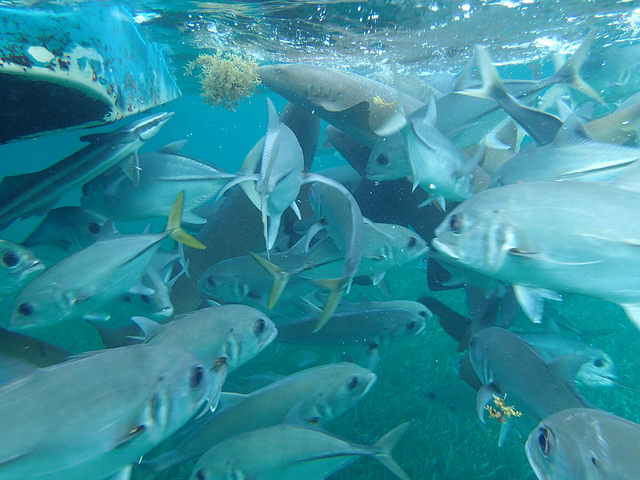Echeneis Neucratoides on:
[Wikipedia]
[Google]
[Amazon]
The whitefin sharksucker (''Echeneis neucratoides'') or short-disk sharksucker, is a species of remora native to subtropical waters of the western

Atlantic Ocean
The Atlantic Ocean is the second-largest of the world's five oceans, with an area of about . It covers approximately 20% of Earth's surface and about 29% of its water surface area. It is known to separate the " Old World" of Africa, Europe ...
, Gulf of Mexico
The Gulf of Mexico ( es, Golfo de México) is an oceanic basin, ocean basin and a marginal sea of the Atlantic Ocean, largely surrounded by the North American continent. It is bounded on the northeast, north and northwest by the Gulf Coast of ...
and Caribbean Sea
The Caribbean Sea ( es, Mar Caribe; french: Mer des Caraïbes; ht, Lanmè Karayib; jam, Kiaribiyan Sii; nl, Caraïbische Zee; pap, Laman Karibe) is a sea of the Atlantic Ocean in the tropics of the Western Hemisphere. It is bounded by Mexico ...
. This fish can reach a length of TL though most fish do not exceed TL. It can be free-swimming, or can attach itself to a host
A host is a person responsible for guests at an event or for providing hospitality during it.
Host may also refer to:
Places
* Host, Pennsylvania, a village in Berks County
People
*Jim Host (born 1937), American businessman
* Michel Host ...
fish or turtle by means of a sucker on the back of the head.
Description
''Echeneis neucratoides'' is a slender remora growing to a maximum length of about . There are bands of small sharp teeth in both jaws, and further bands of teeth on the vomer and palate, as well as granular teeth on the tongue. On the top of the head is a large oval sucker, formed from the modified front dorsal fin, by which the fish attaches to ahost
A host is a person responsible for guests at an event or for providing hospitality during it.
Host may also refer to:
Places
* Host, Pennsylvania, a village in Berks County
People
*Jim Host (born 1937), American businessman
* Michel Host ...
fish. There are between 18 and 22 lamellae in this sucker as compared to the 23 to 28 possessed by the closely related '' Echeneis naucrates''. The pelvic fins have narrow bases, the pectoral fins have moderately pointed tips and are composed of 22 rays, the hind dorsal fin has 32 to 41 rays and the anal fin, 30 to 38. The dorsal surface of the fish is dark brown to black, as is a broad longitudinal lateral stripe which extends from the eye through the pectoral fin to the caudal peduncle. The other parts of the fish are silvery-grey. The dorsal, pectoral and caudal fins are dark with whitish margins, particularly at the front of the fins.

Distribution
This fish occurs in the subtropical western Atlantic Ocean, the Caribbean Sea and Gulf of Mexico, within an area bounded by 43°N and 4°N, and 98°W and 51°W that stretches from Massachusetts to the northern coast of South America, including the Bahamas and the Antilles. It is usually associated with reefs but also occurs further offshore.Ecology
''Echeneis neucratoides'' is sometimes free-swimming, but at other times attaches itself with its sucker to a host animal such as a shark, other large fish or turtle. Remoras often feed on scraps of food discarded by their hosts, and may also consume the parasiticcopepod
Copepods (; meaning "oar-feet") are a group of small crustaceans found in nearly every freshwater and saltwater habitat (ecology), habitat. Some species are planktonic (inhabiting sea waters), some are benthos, benthic (living on the ocean floor) ...
s on their skin.
Status
The taxonomic status of this species has been questioned and molecular studies need to be done to clarify this. Its range seems to be rather more restricted than most other remoras and its population trend is unclear, although it faces no particular threats. Because of these factors, theInternational Union for Conservation of Nature
The International Union for Conservation of Nature (IUCN; officially International Union for Conservation of Nature and Natural Resources) is an international organization working in the field of nature conservation and sustainable use of natu ...
has been unable to assess its conservation status, and has classified it as "data deficient
A data deficient (DD) species is one which has been categorized by the International Union for Conservation of Nature (IUCN) as offering insufficient information for a proper assessment of conservation status to be made. This does not necessaril ...
".
References
{{Taxonbar, from=Q2564442 whitefin sharksucker Fish of the Eastern United States Fish of the Caribbean whitefin sharksucker